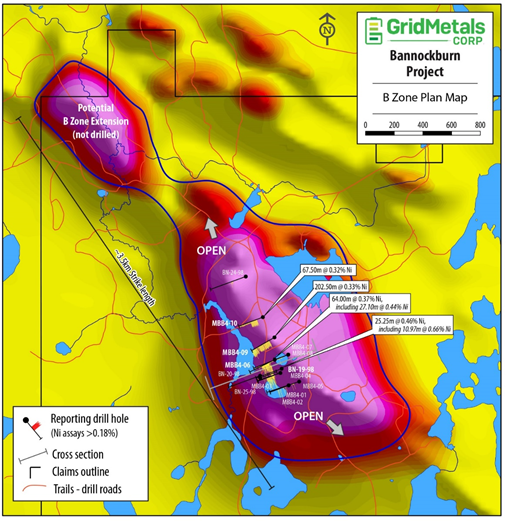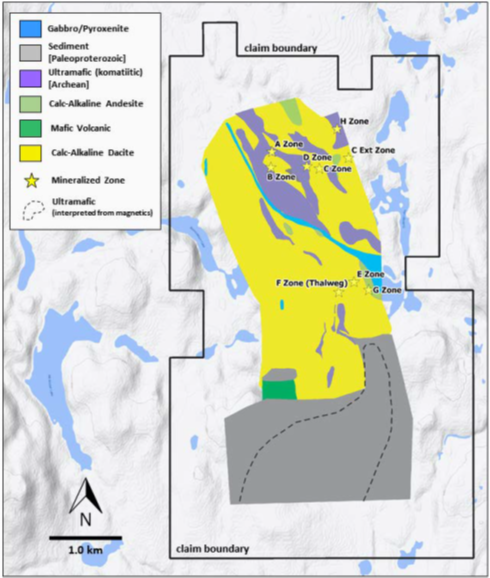TORONTO, ON / ACCESSWIRE / February 17, 2021 / Grid Metals Corp. (the "Company" or "Grid Metals") (TSXV:GRDM) is pleased to announce it has received the Independent National Instrument 43-101 Technical Report ( the "Technical Report") on the Bannockburn Nickel Sulphide Property ( the "Property") located in the Matachewan area, approximately 100 km south of Timmins, Ontario. The author was Caracle Creek International Consulting Inc. of Sudbury, Ontario. The Technical Report was commissioned in order to summarize all relevant geological and historical exploration information on the Bannockburn Property (including 84 drill holes) and obtain independent recommendations for future exploration at the Property. The full report will be filed on SEDAR and will also be made available on the Company's website.
Key Findings of the Bannockburn Property Technical Report
- The style of mineralization present in the B Zone (Mount Keith-type) at Bannockburn is directly comparable to the large-tonnage, low-grade nickel sulfide resources hosted by the Crawford Ultramafic Complex ("CUC") on the Crawford Nickel-Cobalt Sulphide Project, owned by Canada Nickel Company Inc. ("TSXV: CNC"), and the Dumont Nickel Deposit owned by Dumont Nickel Magneto Investments L.P. (and previously Royal Nickel Corporation).
- The B Zone occurs within a ~3.5 km magnetic anomaly that is related to a serpentinized ultramafic body believed to have originated as an adcumulate dunite intrusion similar to that hosting the Crawford nickel deposit.
- The Property shows good potential for developing both low-grade, large tonnage and high-grade, low tonnage nickel (Co, Pt, Pd, Fe) resources and warrants additional exploration given similarities of initial drill intersections, in terms of grade and thickness, to that reported in the Main and East zones at the Crawford Nickel Project.
- The Property is located ~100 km south of Timmins, Ontario near the town of Matachewan in an area with excellent infrastructure. The Property mineral rights are held 100% by Grid Metals by way of 125 contiguous unpatented mining claims that cover approximately 2 700 hectares and are subject to a 2% NSR held by Outokumpu Mining.
- Disseminated nickel mineralization was intercepted in 10 historic drill holes over a 350 metre strike length in the B Zone (see Figure). Drill hole MBB4-09 assayed 0.327% Ni over 202 metres starting at the top of the bedrock surface and bottomed in mineralization. For reference this nickel grade is similar to the grade reported from the Main Higher Grade Zone Measured and Indicated Resources of the Crawford Nickel resource reported Jan. 18, 2021 by Canada Nickel Company.
Notable drill results from the Bannockburn Property disseminated target (the "B Zone") include the following:
|
Drill Hole |
From (m) |
To (m) |
Interval (m) |
Nickel (%) |
|
MBB4-06 |
65.2 |
247.5 |
182.3 |
0.255 |
|
incl |
65.2 |
147.5 |
82.3 |
0.35 |
|
MBB4-09 |
63.5 |
266 |
202.5 |
0.327 |
|
MBB4-10 |
65 |
259.7 |
193.2 |
0.253 |
|
incl. |
65 |
132.5 |
67.5 |
0.323 |
|
BN-19-98 |
103.25 |
128.5 |
25.25* |
0.479 |
|
* no assaying above or below this interval |
||||
Note: core intervals are not true widths; Grid Metals has insufficient information to determine the true width for the host rocks or the mineralized zones and true widths will be less than the core intervals by a number of factors.
Dr. Dave Peck, the Company's Vice President of Exploration and Business Development commented, "The immediate priority for us at Bannockburn is to determine the continuity and potential size of the known Mount Keith-type disseminated nickel sulfide mineralization hosted by the B Zone. We believe that the B Zone is directly analogous to the large mineral resources that Canada Nickel has defined at Crawford. We will be applying 3D magnetic inversion modeling to existing airborne data to guide the next phase of drilling, given the direct correlation we are seeing between alteration intensity, magnetic response and nickel grade in the B Zone."
Mr. Robin Dunbar, the Company's President and CEO added "The growth in demand for nickel is expected to surge with the electrification of automobiles in the coming years. Bannockburn represents a high potential project for Grid Metals with multiple zones of nickel mineralization drill identified. In light of the fundamentals for nickel going forward we view Bannockburn as an excellent project opportunity for Grid to pursue at this time.
Other Technical Report Findings
- A preliminary mineralogical study completed in 2005 by SGS Lakefield on B Zone drill core samples indicates that approximately 71% of the total nickel assay grade is attributable to fine-grained heazlewoodite, which is a nickel-rich secondary (Ni3S2) sulfide mineral believed to have formed during serpentinization of the dunite host rocks. Similar heazlewoodite-rich nickel sulfide mineralization is being reported from the Crawford Nickel project by Canada Nickel. Preliminary metallurgical flotation test work also completed as part of the 2005 SGS study indicated a potential recovery of 52% or higher and a potential nickel concentrate grade as high as 35% nickel for the B Zone.
- In addition to the B Zone Mount Keith-type disseminated sulfide mineralization, several occurrences of komatiite-hosted massive nickel sulphide mineralization ("Kamblada-type") have been identified on the property. The most advanced is the outcropping "C-Zone" but none of the massive sulfide zones have yet been advanced to the stage of mineral resources estimation. Notable historical drill intersections (see Technical Report for locations) include:
- MBC 3-032 (C Zone) intersected 3.35 metres of 2.39% Ni from 8.40 metres
- MBC 4-026 (C Zone) intersected 8.05 metres of 1.35% Ni from 230.5 metres
- MBC 4-047 (F zone) intersected 2.86 metres of 2.04% Ni from 78.24 metres
- BN12-097 (F Zone) intersected 10.58 metres of 1.07% Ni from 414.62 metres downhole depth

Above: Total field magnetic intensity map of part of the Bannockburn Nickel Sulphide Property showing interpreted outline of the large ultramafic body that hosts the B Zone Mount Keith-type disseminated nickel sulfide mineralization. Historical drill holes from Outokumpu Mining (BN series) and Grid Metals (MB series) that intersect the B Zone are also shown. Source: Grid Metals, January 2021.
- The new Technical Report recommends a detailed re-assessment of the numerous electromagnetic survey anomalies on the Property including those associated with known massive nickel sulfide mineralization and those that remain untested.
- The Technical Report also recommends a phased work program of approximately $1.0 million consisting primarily of diamond drilling on the B Zone and including limited additional mineralogical studies and metallurgical test work.
- The Bannockburn Nickel Sulphide Property is permitted for drilling and can be accessed year-round via a network of Provincial roads and secondary logging roads.

Above: Main geologic units and location of mineralized zones at Bannockburn Property.
Dr. Dave Peck, P.Geo., has reviewed and approved the technical content of this release for purposes of National Instrument 43-101.
Technical information in this news release, as it related to the Technical Report, has been reviewed and approved by Dr. Scott Jobin-Bevans (P.Geo.), independent geological consultant and Qualified Person under the definitions established by the NI 43-101.
About Grid Metals Corp.
Grid Metals Corp. is an exploration and development Company that has a diversified portfolio of projects in the nickel-copper-platinum group metal sectors. The Company is currently drilling its East Bull Lake Palladium Property 80 km west of Sudbury Ontario, focused on a new discovery of palladium mineralization. Grid also has a Ni-Cu-PGM-Co resource defined at its Makwa Mayville Project in Manitoba.
To find out more about Grid Metals Corp., please visit www.gridmetalscorp.com.
On Behalf of the Board of Grid Metals Corp.
Robin Dunbar - President, CEO & Director Telephone: 416-955-4773 Email: [email protected]
David Black - Investor Relations Email: [email protected]
We seek safe harbour.
This news release contains forward-looking statements within the meaning of the United States Private Securities Litigation Reform Act of 1995 and forward-looking information within the meaning of the Securities Act (Ontario) (together, "forward-looking statements"). Such forward-looking statements may include the Company's plans for its properties, the overall economic potential of its properties, the availability of adequate financing and involve known and unknown risks, uncertainties and other factors which may cause the actual results, performance or achievements expressed or implied by such forward- looking statements to be materially different. Such factors include, among others, risks and uncertainties relating to potential political risk, uncertainty of production and capital costs estimates and the potential for unexpected costs and expenses, physical risks inherent in mining operations, metallurgical risk, currency fluctuations, fluctuations in the price of nickel, cobalt, copper and other metals, completion of economic evaluations, changes in project parameters as plans continue to be refined, the inability or failure to obtain adequate financing on a timely basis, and other risks and uncertainties, including those described in the Company's Management Discussion and Analysis for the most recent financial period and Material Change Reports filed with the Canadian Securities Administrators and available at www.sedar.com.
Neither the TSX Venture Exchange nor its Regulations Services Provider (as that term is defined in the policies of the TSX Venture Exchange) accepts responsibility for the adequacy or accuracy of this press release.
This news release does not constitute an offer of securities for sale in the United States. The securities being offered have not been, nor will they be, registered under the United States Securities Act of 1933, as amended, and such securities may not be offered or sold within the United States absent U.S. registration or an applicable exemption from U.S. registration requirements.
SOURCE: Grid Metals Corp.




